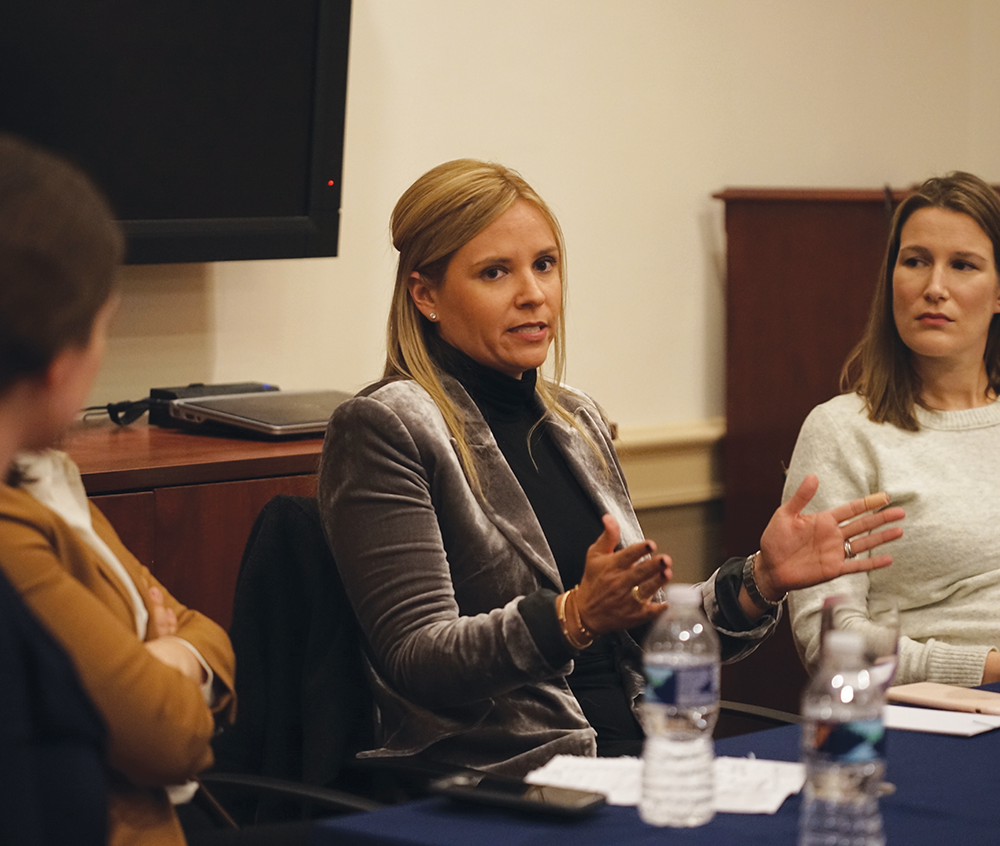Gender bias will not significantly influence voters’ election decisions in the 2020 U.S. presidential election, panelists said at a Dec. 4 event.
The event, titled “Deconstructing Gender Bias: Implications for 2020,” was hosted by the Women in Public Policy Initiative and the Georgetown University Institute for Politics and Public Service at the McCourt School of Public Policy. At the panel event, current and former Institute of of Politics and Public Service fellows reflected on how preconceived notions about individual candidates’ electability may affect the results of the 2020 presidential election.
Looking forward to the 2020 presidential election, voters will not discriminate against candidates based on their gender in the general election, according to Katie Walsh Shields, senior advisor for the Republican National Committee.

Katie Walsh Shields, senior advisor for the Republican National Committee, spoke alongside other McCourt School Fellows about gender bias in politics in a Dec. 4 panel event.
“I don’t believe that, outside of primaries, someone wins or loses an election in this country because of gender,” Shields said. “I think in a general election, specifically a presidential election, I mean, you have to remember that the majority of voters in this country are women.”
The event also featured a discussion between McCourt School Fellows Antonia Ferrier, staff director for Senate Majority Leader Mitch McConnell (R-Ky.), and Olivia Alair Dalton, founder of strategic communications firm Dalton Strategies. Stephanie Valencia, co-founder of EquisLabs, which works to empower the Latino electorate to make their voices heard in American politics, also spoke at the event. Emily Van Dusen, a masters of policy management student and member of WiPPI, moderated the panel.
In the ongoing 2020 Democratic primary, a record six women entered the contest for nominations. Rep. Tulsi Gabbard (D-Hawaii), Sen. Amy Klobuchar (D-Minn.), Sen. Elizabeth Warren (D-Mass.) and self-help author Marianne Williamson are still running to be the Democratic nominee after Sen. Kamala Harris (D-Calif.) disbanded her campaign this week.
Even though conversations about which candidates are most electable seem to dominate conversations in the lead-up to elections, whether or not someone appears to be electable does not matter, according to Valencia.
“I think electability is a little bit of a farce,” Valencia said. “I think, if we look at, over the last few election cycles, including 2016, a lot of people didn’t think Donald Trump was electable. A lot of people thought Hillary Clinton was electable in 2008 and that Barack Obama was not electable in 2008.”
Discussions around electability are irrelevant, as the only way to know whether or not someone is electable is to observe the ultimate results of the race, according to Ferrier.
“There are a lot of reasons why people win or lose, but if they’re electable, the way you tell is if they win,” Ferrier said.
Female candidates struggle to attract fundraising donors due to preconceived notions around female electability. Polling is not representative of the actual voting electorate, which includes a female majority. Additionally, sexism and racial bias are still fervent in both political parties, according to Valencia.
Candidates are not elected to positions based on their gender, but rather their qualifications. Lack of campaign success should be attributed to policy failures instead of a candidate’s gender, according to Ferrier.
“It’s position; it’s not gender. I don’t doubt for a second that it is harder for women to win,” Ferrier said. “I don’t care what political party they are from if there are problems in their campaign. They had missteps and they choose to blame it on their gender as opposed to they were out of step with voters or their campaign made missteps.”
Moving forward, both political parties must work past perceived prejudices when electing the next president in the 2020 election, Valencia said.
“We need to deconstruct what makes somebody electable and I think for the most part it’s probably very similar on the left as it is on the right,” Valencia said. “In both parties, I think we have to deconstruct sexism and racism that exists within our own parties about who is electable.”
This article has been corrected to clarify that current and former Institute of of Politics and Public Service fellows spoke at the event.




















